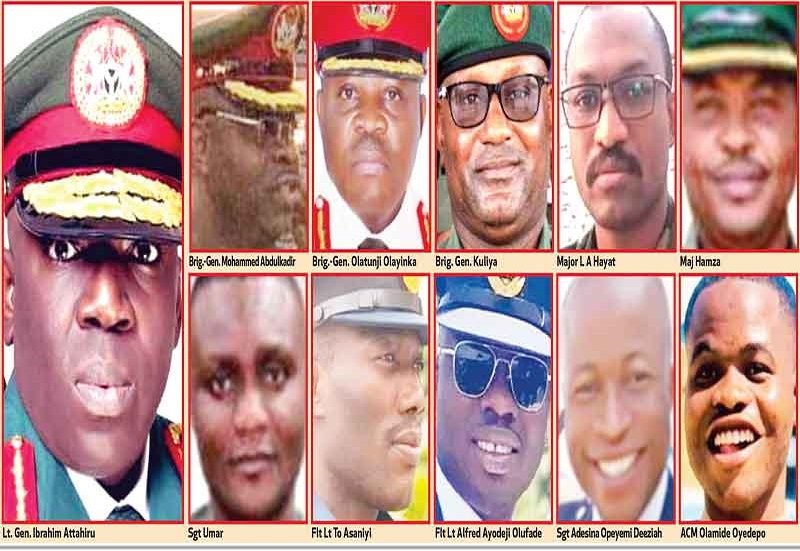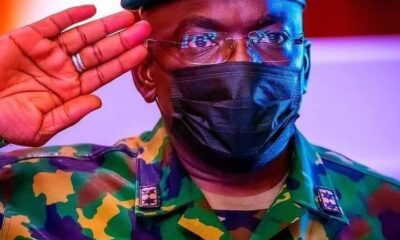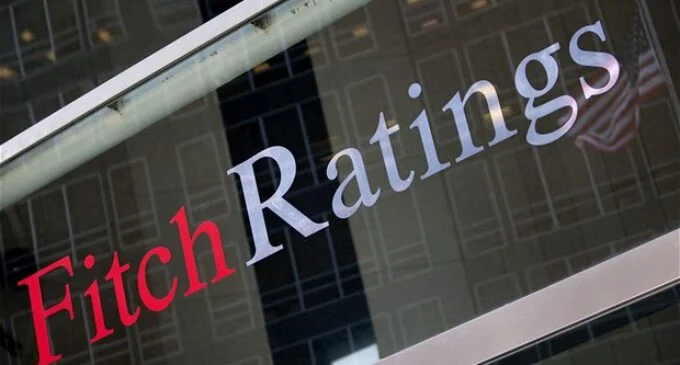Nigerians expecting to know the cause of the military plane crash that killed the Chief of Army Staff, Lieutenant General Ibrahim Attahiru and ten other officers on May 21, may wait in ‘vain’ as the military authorities said it will not make the findings public until after a decade, The Nation has reliably gathered.
Outcomes of accident investigations involving military aircraft are classified and can only be declassified after a period of ten years.
Retired Presidential fleet pilot and aircraft accident investigator with the North Atlantic Treaty Organization Certificate for aircraft accident investigation and flight safety, Air Commodore Peter Gbujie (rtd), told The Nation that it is impossible to determine the cause of an aircraft accident until it is investigated.
According to him, there are a number of factors that could cause an aircraft accident, which he said are captured in the ‘six M-Factor’, which include Man, Machine, Maintenance, Mission, Management and Money.
He said, “when investigating an accident, you discover that there are root causes of an accident, these are what are regarded as immediate causes, then there are contributory factors that are the remote causes that you cannot see until you investigate. Even during investigation, you may not see all the causes, some of them may not be related to a particular accident but may have led to it. So when an accident occurs, the best thing is for people to hold their opinion and then investigate.
“The cause of accident A might be different from the cause of accident B, it could also be the same but what is important is that for an accident to occur, there are chains of events. This chain could have started long ago, even from the recruitment of pilots, even from the selection and purchase of machines, then up to the point of the occurrence of the accident, so for a particular accident to be prevented, somebody has to break the chain along the line with one intervention or the other, particularly if it has been observed.
Read Also; Why Buhari did not attend late COAS Attahiru’s funeral, by Presidency
“Findings of military aircraft accidents are classified and are never made public until after ten years when they are declassified, but the lessons will be adopted for safe conduct of flights”.
On whether the brand of aircraft could be responsible for the air crashes, Gbujie said, “not necessarily so, you cannot do away with a machine because the brand has been involved in two accidents within a period of three or four months, it is not sufficient evidence that something is wrong with the machine.
“Secondly, has the first accident been thoroughly investigated, has the lessons learnt if any has it been applied in the field or in the organization before the occurrence of the second accident. The second accident has it any relationship with the circumstances surrounding the first one, all these are begging for answers.
“It is possible that nothing is wrong with the aeroplane, after all some many other organizations are flying them safely but it is important to note that aircraft accident investigation is a scientific procedure, it involves experiments, controlling both variable and constant factors in order to get an outcome”.
But Gbujie, who was a member of the panels that investigated the planes crashes that killed the son of late military dictator, Ibrahim Abacha on 17 January, 1996 and the Obudu plane crash that claimed the lives of 12 Generals in 2006, said 95.7 percent of plane crashes are caused by human error.
On what should be done to minimize military plane crashes, he advised that, “when there are frequent accidents like this, it calls for organizational re-examination and review, self-critic. The organization must make sure that the accidents are thoroughly investigated without bias, put people who have experience in air accident investigation; they could even invite those who are retired who will investigate and give objective reports.
“Secondly, the organization could conduct an in-house seminar involving the personnel and retired officers to come teach flight management and safety, how they select people who go for particular mission, their proficiency level and number of hours they fly before taking command, even after taking command, how often do they undergo recertification.”
Outcomes of accident investigations involving military aircraft are classified and can only be declassified after a period of ten years.
Retired Presidential fleet pilot and aircraft accident investigator with the North Atlantic Treaty Organization Certificate for aircraft accident investigation and flight safety, Air Commodore Peter Gbujie (rtd), told The Nation that it is impossible to determine the cause of an aircraft accident until it is investigated.
According to him, there are a number of factors that could cause an aircraft accident, which he said are captured in the ‘six M-Factor’, which include Man, Machine, Maintenance, Mission, Management and Money.
He said, “when investigating an accident, you discover that there are root causes of an accident, these are what are regarded as immediate causes, then there are contributory factors that are the remote causes that you cannot see until you investigate. Even during investigation, you may not see all the causes, some of them may not be related to a particular accident but may have led to it. So when an accident occurs, the best thing is for people to hold their opinion and then investigate.
“The cause of accident A might be different from the cause of accident B, it could also be the same but what is important is that for an accident to occur, there are chains of events. This chain could have started long ago, even from the recruitment of pilots, even from the selection and purchase of machines, then up to the point of the occurrence of the accident, so for a particular accident to be prevented, somebody has to break the chain along the line with one intervention or the other, particularly if it has been observed.
Read Also; Why Buhari did not attend late COAS Attahiru’s funeral, by Presidency
“Findings of military aircraft accidents are classified and are never made public until after ten years when they are declassified, but the lessons will be adopted for safe conduct of flights”.
On whether the brand of aircraft could be responsible for the air crashes, Gbujie said, “not necessarily so, you cannot do away with a machine because the brand has been involved in two accidents within a period of three or four months, it is not sufficient evidence that something is wrong with the machine.
“Secondly, has the first accident been thoroughly investigated, has the lessons learnt if any has it been applied in the field or in the organization before the occurrence of the second accident. The second accident has it any relationship with the circumstances surrounding the first one, all these are begging for answers.
“It is possible that nothing is wrong with the aeroplane, after all some many other organizations are flying them safely but it is important to note that aircraft accident investigation is a scientific procedure, it involves experiments, controlling both variable and constant factors in order to get an outcome”.
But Gbujie, who was a member of the panels that investigated the planes crashes that killed the son of late military dictator, Ibrahim Abacha on 17 January, 1996 and the Obudu plane crash that claimed the lives of 12 Generals in 2006, said 95.7 percent of plane crashes are caused by human error.
On what should be done to minimize military plane crashes, he advised that, “when there are frequent accidents like this, it calls for organizational re-examination and review, self-critic. The organization must make sure that the accidents are thoroughly investigated without bias, put people who have experience in air accident investigation; they could even invite those who are retired who will investigate and give objective reports.
“Secondly, the organization could conduct an in-house seminar involving the personnel and retired officers to come teach flight management and safety, how they select people who go for particular mission, their proficiency level and number of hours they fly before taking command, even after taking command, how often do they undergo recertification.”


 News3 years ago
News3 years ago
 Entertainment2 years ago
Entertainment2 years ago
 News3 years ago
News3 years ago
 Privacy3 years ago
Privacy3 years ago
 Sports2 years ago
Sports2 years ago
 Entertainment2 years ago
Entertainment2 years ago
 News3 years ago
News3 years ago
 Opinion3 years ago
Opinion3 years ago






